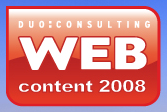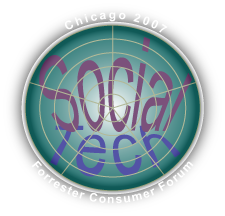Christopher Rollyson tapped to support LinkedIn, Inc. in Chicago coaching sessions for CMOs that will focus on enhancing LinkedIn Profiles […]
How Social Networks Boost Market Efficiency for B2B Buyers and Sellers explains how to use LinkedIn to change the rules of business development
 Since the early 2000s, everyone has struggled to develop measurable economic models for social media and Web 2.0, mostly with little success. During 2007 and 2008, CSRA has worked with clients on several levels hammering out models to pass enterprise muster, and here I will briefly share one that shows considerable promise for its practicality and utility to businesses. The immediate context is B2B business development and sales, but it is applicable to numerous other enterprise processes as well. Since the early 2000s, everyone has struggled to develop measurable economic models for social media and Web 2.0, mostly with little success. During 2007 and 2008, CSRA has worked with clients on several levels hammering out models to pass enterprise muster, and here I will briefly share one that shows considerable promise for its practicality and utility to businesses. The immediate context is B2B business development and sales, but it is applicable to numerous other enterprise processes as well.
[…]
The Social Network Roadmap’s Web 2.0 Readiness Assessment is a service offering that gives the enterprise a firm understanding of how its “traditional” USPs translate to serving stakeholders in the Web 2.0 world. The Web 2.0 Ecosystem Audit has pinpointed what venues and activities are relevant to stakeholders, so the company is now set to create programs to engage stakeholders. […]
An increasingly tangible Web 2.0 ecosystem is growing up around all organizations, but they don’t know what it looks like, much less how to engage it. Your firm’s leaders need to understand how the people you care about are contributing to and learning from the conversations in Web 2.0 venues. Social media means that the ecosystem of market participants around your business is far more actionable than ever before.. and transparent. It’s also easier for your company to engage.. when you know how. The Web 2.0 Ecosystem Audit delivers the picture and understanding. […]
Opportunity to break the story on new enterprise social network enablement program for marketing, social media, IT and strategy executives […]
Enterprise 2.0 and B2C Web 2.0 Show Serious Traction—But Social Sticky Wickets Remain—How to Trust?
 The Social Networking Conference (SNC) was an excellent place to check the pulse of Web 2.0 adoption from customer and provider perspectives. Producer Marc Lesnick explained in his opening remarks that, in the months preceding this conference, corporations had knocked on his door asking to get involved. His Ticonderoga Ventures had held several SNCs over the past few years, and it had been largely the purview of social networking start-ups and their facilitators. This is a very apt indication of the enterprise adoption predicted by my State of Social Networking Forrester coverage and 2007 Review. The Social Networking Conference (SNC) was an excellent place to check the pulse of Web 2.0 adoption from customer and provider perspectives. Producer Marc Lesnick explained in his opening remarks that, in the months preceding this conference, corporations had knocked on his door asking to get involved. His Ticonderoga Ventures had held several SNCs over the past few years, and it had been largely the purview of social networking start-ups and their facilitators. This is a very apt indication of the enterprise adoption predicted by my State of Social Networking Forrester coverage and 2007 Review.
SNC SF 2008 took place July 10-11, 2008 at the UC San Francisco’s Mission Bay Conference Center. It was a focused conference that balanced start-ups’ and enterprises’ innovation—with a dash of perspective from Apple co-founder Steve Wozniak and Social Networking Watch’s Mark Brooks. On the enterprise side, GE’s Grewal and GM’s Denison covered the enterprise 2.0 and B2C Web 2.0 perspectives respectively, while the U.S. Air Force’s Adkins presented nascent cross-boundary collaboration in […]
Reexamining “Content” in Light of “Conversation”
 Web 2.0 is redefining content on the Web, and Duo Consulting’s and Content Wrangler’s Web Content 2008 Chicago, convened at the UBS Tower on June 17-18, 2008, was a rich opportunity to check in with the Web 1.0-Web 2.0 mashup. Embedded within the legacy concept of “content” (text, pictures, audio, video, etc.) is that few people create it and many people consume it, which is obviously less true with every passing month. Web 2.0 is redefining content on the Web, and Duo Consulting’s and Content Wrangler’s Web Content 2008 Chicago, convened at the UBS Tower on June 17-18, 2008, was a rich opportunity to check in with the Web 1.0-Web 2.0 mashup. Embedded within the legacy concept of “content” (text, pictures, audio, video, etc.) is that few people create it and many people consume it, which is obviously less true with every passing month.
Something else is happening on the way to the forum, too: opinions about content are gaining more attention than the content itself, according to Day One keynote Dick Costolo. If so, where does that leave people who “manage” content? There is a whole ecosystem of professionals and vendors that manage content according to Web 1.0 rules, and many of them were here, sharing their visions and tactics for embracing Web 2.0. Day Two keynote Jerome Nadel provided a clue: a shift in emphasis to design: since “users” are creating the opinion content through their “conversation,” I’ll hazard that a key part of […]
Geography 3.0, What It Is and What It Means predicts a new synthesis in the Knowledge Economy—fast forward to the past—Plus, the fire
 Noodles are largely driven by intuition and holistic mental doodling, and this one has been simmering a long time*. I believe that there is profound meaning in virtual and literal “mobility,” and I’ll explore its significance in terms geography and human relationships. Geography has always had a profound impact on how humans have lived and the organizations in which we have lived, and when its meaning shifts, our lives are transformed. This is of paramount importance because human relationships are currently transitioning from geography-based to interest-based. Many governments and businesses harbor business rules that assume geography-based relationships, and, unless they appreciate the shift to interest-based relationships, they will experience disruption’s spin cycle. Lose a turn. Don’t pass go ,^) Noodles are largely driven by intuition and holistic mental doodling, and this one has been simmering a long time*. I believe that there is profound meaning in virtual and literal “mobility,” and I’ll explore its significance in terms geography and human relationships. Geography has always had a profound impact on how humans have lived and the organizations in which we have lived, and when its meaning shifts, our lives are transformed. This is of paramount importance because human relationships are currently transitioning from geography-based to interest-based. Many governments and businesses harbor business rules that assume geography-based relationships, and, unless they appreciate the shift to interest-based relationships, they will experience disruption’s spin cycle. Lose a turn. Don’t pass go ,^)
Before exploring how these things will unfold in Part II, let’s review three geographies and four economies here in Part I…
[…]
Year in Review 2007—Editor’s Choice of the Global Human Capital Journal
 As I reflect on 2007 and create strategy for 2008, several macro-trends come into sharp relief, and I believe that some of them might be helpful to you as you conduct your own planning. As always, I focus on emerging phenomena because they are areas in which disruption and discontinuous change are acting on markets, thereby elevating threats and opportunities. Helping leaders to create strategy to manage the risk of unusual market developments is the focus of my consulting practice. As I reflect on 2007 and create strategy for 2008, several macro-trends come into sharp relief, and I believe that some of them might be helpful to you as you conduct your own planning. As always, I focus on emerging phenomena because they are areas in which disruption and discontinuous change are acting on markets, thereby elevating threats and opportunities. Helping leaders to create strategy to manage the risk of unusual market developments is the focus of my consulting practice.
In 2007 it became clear to me that we were entering a profound social transformation that would produce an unimaginable degree of change. Unlike the technology-precipitated change that I’ve been helping people with since the 1990s, technology is shifting to the background now, and pervasive social change is taking the stage. Look for disruption in all areas affected by how people connect, communicate, purchase and collaborate: business, politics, community and leisure. Moreover, these changes are completely global with all the variations that engenders.
I can’t tell […]
How Social Tagging Changes the Economics of Ecommerce was a geeky session that explained how a potent mix of “people like me” navigation and digital leverage can drive sales and profits + The secret to emerging markets?
 The Global Human Capital Journal’s coverage of the Forrester Consumer Forum 2007 continues with this session on social tagging. Before your eyes glaze over, bear with me and learn how this simple, revolutionary social technology can help your customers to help your business. Forrester’s Sarah Rotman Epps moderated a discussion with Brian Rosenblat, Online Retail Industry Lead, Endeca Technologies and Jay Shaffer, Vice President Marketing, PowerReviews, who represented companies that offer social tagging solutions, and they all shared numerous examples. The Global Human Capital Journal’s coverage of the Forrester Consumer Forum 2007 continues with this session on social tagging. Before your eyes glaze over, bear with me and learn how this simple, revolutionary social technology can help your customers to help your business. Forrester’s Sarah Rotman Epps moderated a discussion with Brian Rosenblat, Online Retail Industry Lead, Endeca Technologies and Jay Shaffer, Vice President Marketing, PowerReviews, who represented companies that offer social tagging solutions, and they all shared numerous examples.
This was one of the most “actionable opportunity” sessions of the conference: tagging is a relatively unknown, simple, yet transformational Web 2.0 phenomenon that will gain traction in 2008 and explode in 2009. If you aren’t doing it, you will be at a significant disadvantage to your competitors who do.
The Global Human Capital Journal published the overall conference […]
|
|

 Since the early 2000s, everyone has struggled to develop measurable economic models for social media and Web 2.0, mostly with little success. During 2007 and 2008, CSRA has worked with clients on several levels hammering out models to pass enterprise muster, and here I will briefly share one that shows considerable promise for its practicality and utility to businesses. The immediate context is B2B business development and sales, but it is applicable to numerous other enterprise processes as well.
Since the early 2000s, everyone has struggled to develop measurable economic models for social media and Web 2.0, mostly with little success. During 2007 and 2008, CSRA has worked with clients on several levels hammering out models to pass enterprise muster, and here I will briefly share one that shows considerable promise for its practicality and utility to businesses. The immediate context is B2B business development and sales, but it is applicable to numerous other enterprise processes as well. The Social Networking Conference (SNC) was an excellent place to check the pulse of Web 2.0 adoption from customer and provider perspectives. Producer Marc Lesnick explained in his opening remarks that, in the months preceding this conference, corporations had knocked on his door asking to get involved. His Ticonderoga Ventures had held several SNCs over the past few years, and it had been largely the purview of social networking start-ups and their facilitators. This is a very apt indication of the enterprise adoption predicted by my State of Social Networking Forrester coverage and 2007 Review.
The Social Networking Conference (SNC) was an excellent place to check the pulse of Web 2.0 adoption from customer and provider perspectives. Producer Marc Lesnick explained in his opening remarks that, in the months preceding this conference, corporations had knocked on his door asking to get involved. His Ticonderoga Ventures had held several SNCs over the past few years, and it had been largely the purview of social networking start-ups and their facilitators. This is a very apt indication of the enterprise adoption predicted by my State of Social Networking Forrester coverage and 2007 Review. Web 2.0 is redefining content on the Web, and Duo Consulting’s and Content Wrangler’s Web Content 2008 Chicago, convened at the UBS Tower on June 17-18, 2008, was a rich opportunity to check in with the Web 1.0-Web 2.0 mashup. Embedded within the legacy concept of “content” (text, pictures, audio, video, etc.) is that few people create it and many people consume it, which is obviously less true with every passing month.
Web 2.0 is redefining content on the Web, and Duo Consulting’s and Content Wrangler’s Web Content 2008 Chicago, convened at the UBS Tower on June 17-18, 2008, was a rich opportunity to check in with the Web 1.0-Web 2.0 mashup. Embedded within the legacy concept of “content” (text, pictures, audio, video, etc.) is that few people create it and many people consume it, which is obviously less true with every passing month. Noodles are largely driven by intuition and holistic mental doodling, and this one has been simmering a long time*. I believe that there is profound meaning in virtual and literal “mobility,” and I’ll explore its significance in terms geography and human relationships. Geography has always had a profound impact on how humans have lived and the organizations in which we have lived, and when its meaning shifts, our lives are transformed. This is of paramount importance because human relationships are currently transitioning from geography-based to interest-based. Many governments and businesses harbor business rules that assume geography-based relationships, and, unless they appreciate the shift to interest-based relationships, they will experience disruption’s spin cycle. Lose a turn. Don’t pass go ,^)
Noodles are largely driven by intuition and holistic mental doodling, and this one has been simmering a long time*. I believe that there is profound meaning in virtual and literal “mobility,” and I’ll explore its significance in terms geography and human relationships. Geography has always had a profound impact on how humans have lived and the organizations in which we have lived, and when its meaning shifts, our lives are transformed. This is of paramount importance because human relationships are currently transitioning from geography-based to interest-based. Many governments and businesses harbor business rules that assume geography-based relationships, and, unless they appreciate the shift to interest-based relationships, they will experience disruption’s spin cycle. Lose a turn. Don’t pass go ,^) As I reflect on 2007 and create strategy for 2008, several macro-trends come into sharp relief, and I believe that some of them might be helpful to you as you conduct your own planning. As always, I focus on emerging phenomena because they are areas in which disruption and discontinuous change are acting on markets, thereby elevating threats and opportunities. Helping leaders to create strategy to manage the risk of unusual market developments is the focus of my consulting practice.
As I reflect on 2007 and create strategy for 2008, several macro-trends come into sharp relief, and I believe that some of them might be helpful to you as you conduct your own planning. As always, I focus on emerging phenomena because they are areas in which disruption and discontinuous change are acting on markets, thereby elevating threats and opportunities. Helping leaders to create strategy to manage the risk of unusual market developments is the focus of my consulting practice. The Global Human Capital Journal’s coverage of the Forrester Consumer Forum 2007 continues with this session on social tagging. Before your eyes glaze over, bear with me and learn how this simple, revolutionary social technology can help your customers to help your business. Forrester’s Sarah Rotman Epps moderated a discussion with Brian Rosenblat, Online Retail Industry Lead, Endeca Technologies and Jay Shaffer, Vice President Marketing, PowerReviews, who represented companies that offer social tagging solutions, and they all shared numerous examples.
The Global Human Capital Journal’s coverage of the Forrester Consumer Forum 2007 continues with this session on social tagging. Before your eyes glaze over, bear with me and learn how this simple, revolutionary social technology can help your customers to help your business. Forrester’s Sarah Rotman Epps moderated a discussion with Brian Rosenblat, Online Retail Industry Lead, Endeca Technologies and Jay Shaffer, Vice President Marketing, PowerReviews, who represented companies that offer social tagging solutions, and they all shared numerous examples.